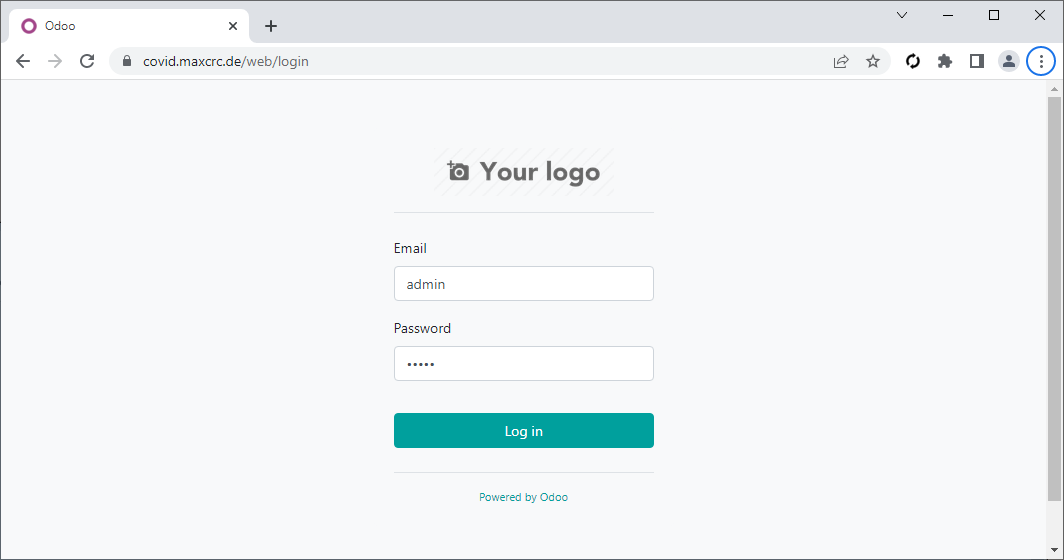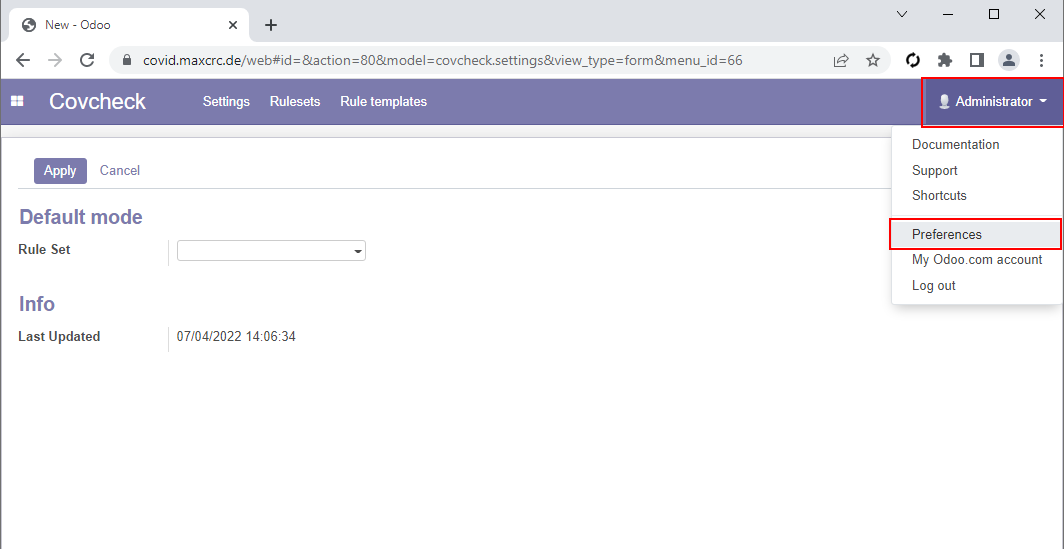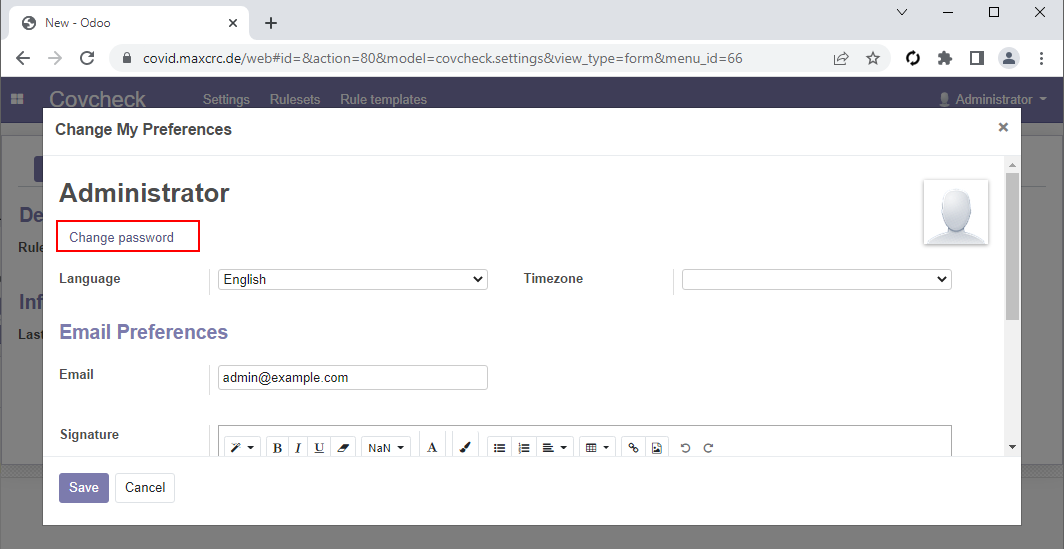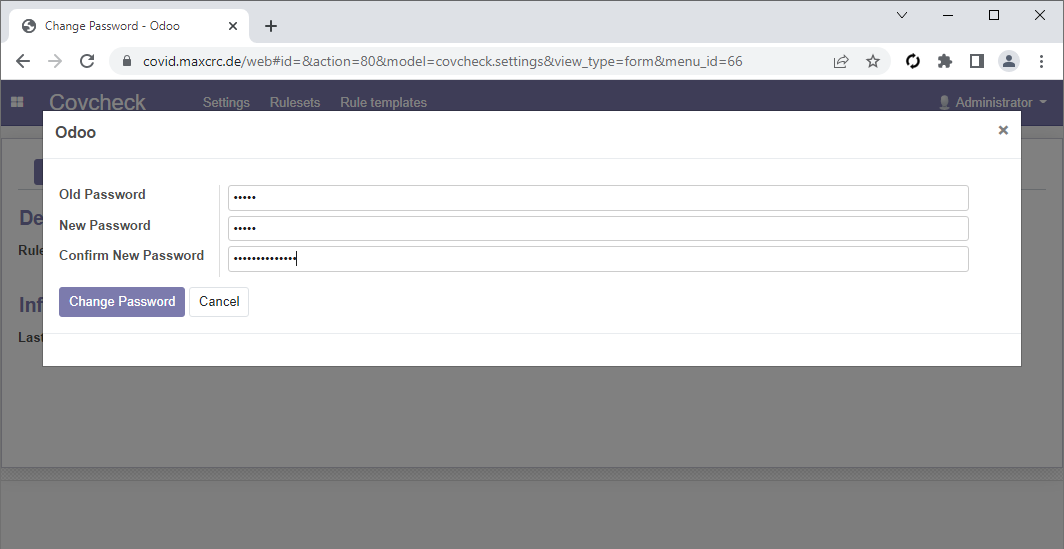Covcheck: Unterschied zwischen den Versionen
(Markierung: 2017-Quelltext-Bearbeitung) |
(Markierung: 2017-Quelltext-Bearbeitung) |
Inhaltsverzeichnis
Introduction[Bearbeiten | Quelltext bearbeiten]
The document describes how to install the Covcheck application server and configure a Galaxy Gate so that COVID certificates and tests presented at the gate can be validated through the server's REST API.
Installation of Covcheck Application Server[Bearbeiten | Quelltext bearbeiten]
Prerequisites[Bearbeiten | Quelltext bearbeiten]
- Ubuntu 22.04 mit Internetzugang
- Benutzer mit sudo-Berechtigungen und Verfügbarkeit eines Benutzers mit der ID 1000 (cat /etc/passwd | grep 1000)
- Archiv covid-installer.tar.gz mit den Dateien, die in [Installationsdateien](#installation-files) aufgelistet sind
Installation StepsInstallationsschritte[Bearbeiten | Quelltext bearbeiten]
- Verbinden Sie sich mit ssh mit dem Ubuntu-Server
- Kopieren Sie covid-installer.tar.gz in ein lokales Verzeichnis
- Führen Sie den folgenden Befehl aus:
tar xvf covid-installer.tar.gz && cd ./covid-installer
- Modify file .env and specify the database password (POSTGRES_PASSWORD) and, if necessary, host name (ODOO_HOST_NAME) and timezone (TZ):
POSTGRES_PASSWORD=gR7K6GT8MvQHpvLs
ODOO_HOST_NAME=covcheck.maxcr.de
TZ=Europe/Berlin
- If SSL certificates are provided for domain name ODOO_HOST_NAME put them into directory /etc/nginx/certs, e.g:
sudo mkdir -p /etc/nginx/certs
sudo tar xvf certs.tar.gz -C /
- If SSL certificates are not available, HTTP connection will be used and you need to modify file **docker-compose** accordingly:
◦ Add this section to container **odoo**:
ports:
- 80:8069
◦ Comment out or remove port 80 for container **nginx_proxy**:
ports:
# - 80:80
- 443:443
- Run the installer script:
script=install-covcheck.sh && chmod +x $script && ./$script -i
- The installation is finished successfully if you see this line in the shell:
### Installation finished successfully
You can make sure that the Covcheck is installed and running by executing the following command:
curl https://covcheck.maxcrc.de/covcheck/status
The reply must be a JSON like as follows:
{
"status":"ok",
"last_update":"2022-07-04 12:06:34"
}
Installation Files[Bearbeiten | Quelltext bearbeiten]
- .env
- environment variables
- boot-covid-install.sh
- development script
- covcheck.tar.gz
- archived covcheck and request_extension ODOO addons
- covid-installer.tar.gz
- archive of other files from this list
- docker-compose.yml
- docker compose file
- install-covid.sh
- primary installation script
- nginx-vhost
- template vhost file for nginx
- odoo.conf
- configuration file for ODOO
- README.md
- this file
Configuration of Covcheck Application Server[Bearbeiten | Quelltext bearbeiten]
Change Default Password[Bearbeiten | Quelltext bearbeiten]
- Open the address of the server in a browser and loging using the following default credentials:
| Username | Password |
|---|---|
| admin | admin |
- Click the Administrator in the top right corner and then Preferences:
- In the opened window click Change password:
-
Fill-in the following fields and then click Change Password:
- Old Password
- New Password
- Confirm New Password
Managing Rulesets[Bearbeiten | Quelltext bearbeiten]
You can add, modify and delete rulesets on the Rulesets page. For example, let us create a ruleset 3G+.
Configuration of Galaxy Gate[Bearbeiten | Quelltext bearbeiten]
Dispatcher[Bearbeiten | Quelltext bearbeiten]
Display[Bearbeiten | Quelltext bearbeiten]
__TOC__
[[Kategorie:Galaxy Gate]]
{{DEFAULTSORT:Covcheck}}
==Introduction==
The document describes how to install the '''Covcheck''' application server and configure a Galaxy Gate so that COVID certificates and tests presented at the gate can be validated through the server's REST API.
==Installation of Covcheck Application Server==
===Prerequisites===
*Ubuntu 22.04 mit Internetzugang
*Benutzer mit '''sudo'''-Berechtigungen und Verfügbarkeit eines Benutzers mit der ID 1000 (''cat /etc/passwd | grep 1000'')
*Archiv '''covid-installer.tar.gz''' mit den Dateien, die in [Installationsdateien](#installation-files) aufgelistet sind
===Installation StepsInstallationsschritte===
*Verbinden Sie sich mit '''ssh''' mit dem Ubuntu-Server
*Kopieren Sie '''covid-installer.tar.gz''' in ein lokales Verzeichnis
*Führen Sie den folgenden Befehl aus:
<syntaxhighlight>
tar xvf covid-installer.tar.gz && cd ./covid-installer
</syntaxhighlight>
*Modify file '''.env''' and specify the database password ('''POSTGRES_PASSWORD''') and, if necessary, host name ('''ODOO_HOST_NAME''') and timezone ('''TZ'''):
<syntaxhighlight>POSTGRES_PASSWORD=gR7K6GT8MvQHpvLs
ODOO_HOST_NAME=covcheck.maxcr.de
TZ=Europe/Berlin</syntaxhighlight>
*If SSL certificates are provided for domain name '''ODOO_HOST_NAME''' put them into directory '''/etc/nginx/certs''', e.g:
<syntaxhighlight>
sudo mkdir -p /etc/nginx/certs
sudo tar xvf certs.tar.gz -C /
</syntaxhighlight>
*If SSL certificates are not available, HTTP connection will be used and you need to modify file **docker-compose** accordingly:
◦ Add this section to container **odoo**:
<syntaxhighlight>
ports:
- 80:8069 </syntaxhighlight>
◦ Comment out or remove port 80 for container **nginx_proxy**:
<syntaxhighlight>
ports:
# - 80:80
- 443:443 </syntaxhighlight>
*Run the installer script:
<syntaxhighlight>script=install-covcheck.sh && chmod +x $script && ./$script -i</syntaxhighlight>
*The installation is finished successfully if you see this line in the shell:
<syntaxhighlight>### Installation finished successfully</syntaxhighlight>
You can make sure that the Covcheck is installed and running by executing the following command:
<syntaxhighlight>curl https://covcheck.maxcrc.de/covcheck/status</syntaxhighlight>
The reply must be a JSON like as follows:
<syntaxhighlight>{
"status":"ok",
"last_update":"2022-07-04 12:06:34"
}</syntaxhighlight>
===Installation Files===
;.env :environment variables
;boot-covid-install.sh :development script
;covcheck.tar.gz :archived covcheck and request_extension ODOO addons
;covid-installer.tar.gz :archive of other files from this list
;docker-compose.yml :docker compose file
;install-covid.sh :primary installation script
;nginx-vhost :template vhost file for nginx
;odoo.conf :configuration file for ODOO
;README.md :this file
==Configuration of Covcheck Application Server==
===Change Default Password===
* Open the address of the server in a browser and loging using the following default credentials:
{| class="wikitable"
!Username
!Password
|-
|admin
|admin
|}
[[Datei:covcheck-login.png|ohne]]
* Click the '''Administrator''' in the top right corner and then '''Preferences''':
[[Datei:covcheck-admin.png|ohne]]
* In the opened window click '''Change password''':
[[Datei:covcheck-change-password.png|ohne]]
* Fill-in the following fields and then click '''Change Password''':
** Old Password
** New Password
** Confirm New Password
[[Datei:covcheck-change-password2.png|ohne]]
===Managing Rulesets===
You can add, modify and delete rulesets on the '''Rulesets''' page. For example, let us create a ruleset '''3G+'''.
==Configuration of Galaxy Gate==
===Dispatcher===
===Display===| Zeile 16: | Zeile 16: | ||
*Archiv '''covid-installer.tar.gz''' mit den Dateien, die in [Installationsdateien](#installation-files) aufgelistet sind | *Archiv '''covid-installer.tar.gz''' mit den Dateien, die in [Installationsdateien](#installation-files) aufgelistet sind | ||
| − | === | + | ===Installation Steps=== |
*Verbinden Sie sich mit '''ssh''' mit dem Ubuntu-Server | *Verbinden Sie sich mit '''ssh''' mit dem Ubuntu-Server | ||
| Zeile 119: | Zeile 119: | ||
You can add, modify and delete rulesets on the '''Rulesets''' page. For example, let us create a ruleset '''3G+'''. | You can add, modify and delete rulesets on the '''Rulesets''' page. For example, let us create a ruleset '''3G+'''. | ||
| + | |||
| + | ==Configuration of Galaxy Gate== | ||
| + | |||
| + | ===Dispatcher=== | ||
| + | ===Display=== | ||
Abgerufen von „https://docs.maxcrc.de/w/index.php?title=Covcheck&oldid=7305“



